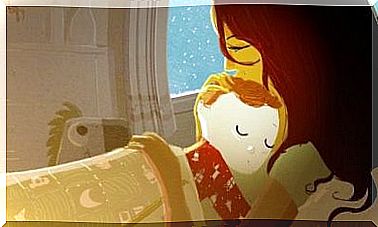Lessons We’ve Forgotten Over Time

Forgetting is a curious phenomenon. Often anarchic, capricious and almost always faithful to revision, as we learned well in our student phase. It is also faithful to the memories that we hold in our memory with emotion. There are memories and lessons that we forget over time. They can be the memory of one time, the first time they took us to the circus, or several, those stories they told us with love and patience before going to sleep. Because there is nothing that attracts the most beautiful dreams than a good story.
Time passes and our grandparents look on with concern, not joy, at our threat to touch the top of the door. They see us as small, but at the same time they imagine us as giants. So they look all over the house for that pencil to paint on the wall proof that we’re a little taller today than yesterday.
On our way to heaven, we learned that patience often pays more than impulse. That life can be very beautiful, but that it also has surprises around every corner. We see how the sky becomes cloudy, it rains and the sun rises again. We appreciate how nature is a matter of cycles and that many of the processes we go through are also. We discover that kings don’t exist, that we are parents, and that parents fail and are wrong, but we will rarely find something as perfect as their way of loving us.
But not only do we learn, we also start to forget important things. So, if you like, let’s rummage through this oblivion chest a bit and let’s see what we find!
Lessons we forget over time

we forgot to negotiate
I believe children are excellent negotiators. For them, denial is the principle of negotiation. They are stubborn, tenacious and believe in their possibilities. Also, they know they have a lot of weapons. The first is to ask for what they want at the right time : when parents are happy and more flexible, when parents are tired and their resistance is less, or when parents are dealing with an important issue and their priority will be to close the negotiation.
The second is to insist. Did you say no? So I’m going to make the cutest good boy face you’ve ever seen. Still saying no? Surely you didn’t see the face I made. Look! Still the same, right? So it’s time to make an offer. If you give it to me now, I promise I’ll behave all day. Nothing? So you’ll see, I’m going to stand here in the middle of the street until we deal with this matter as seriously as it deserves.
Well, you are already starting to get nervous. You don’t like this situation. Well know that I don’t like not having what I want either. If you try to take it away from me, I’ll resist using strategies you won’t use, like throwing me to the ground. You are already very nervous because everyone is looking at us. Okay, okay, if you’re going to threaten not to go out to the park this afternoon, I’ll get up. But before, listen, now you won’t give me what I want, but later you promise you will, won’t you? Along with that good-boy face, of course.
Adults tend to lose this natural inclination to insist, especially when we receive a negative response from other people rather than reality. Sometimes fear and other times comfort make us conform to the answer we already have, sending the desire to the drawer of oblivion.
We forget to ask when we don’t know something
As we grow, we form an image of ourselves. We don’t know for sure how others see us, but we can intuit. On the other hand, there are certain attributes that we would not want to include in this image that we project. Liar? I do not! Manipulator? I do not! Proud? I do not! Ignorant? Of course not! At least no more ignorant than other people.
The truth is that, if in the current moment in which we live, the attitude seems to multiply this factor of knowledge and social support, there was a not-too-distant past in which the amount of knowledge was what counted most, for example, for a company at the time to hire us. So looking ignorant was not a good idea.
What do children do? They ask, ask, ask. Whether the topic is delicate, interesting or trivial. They want to know how, why, what for, where it comes from and what consequences it will have. They assume, like us deep down, that they don’t know much, but unlike us, they don’t understand how the act of asking can distort their image. For them, before appearance there is a fascination for knowledge. A fascination that is often part of the lessons we forget over time.
we forgot to say what we think
It’s nine o’clock. I’m about to arrive and my legs are shaking a little. What are they like? Will they like me? I should have put on less clothes. Breathe. One two Three…
The door opens and my girlfriend’s mom opens the door. She smiles at us, we smile back. She invites us in and I try not to trip over the rug. A few courtesy questions and before I know it, after going through one or another question, I find myself in front of a dish I don’t like. In fact, I hate it. But who’s going to say no when it’s the “house specialty”? She is a very good cook. I close my eyes and eat.
Second visit, we repeated the situation. This time the dish is twice as big. And just like that, there are many situations in life where it’s really hard not to appear impolite for fear of offending.
A child hardly supports a situation that he doesn’t like at all, he hardly relegates what he thinks to the drawer of oblivion. The natural evolution of this child in adulthood would be to express this, but with greater self-control – possible thanks to the evolution of the frontal cortex and the assimilation of certain social norms – that is, taking care not to offend anyone.

We forgot to go after new experiences
If there is anything that characterizes childhood, it is the fact that it is the age of discoveries. The first time we drop an object on the ground and watch what happens next, the first time we walk alone or the first time we sleep at a friend’s house without the supervision of our parents.
These first few times not only provide the thrill of experiencing them, they also fuel the imagination by fantasizing before they happen. We rarely see a child squander the opportunity to try because he is tired. Your curiosity is far more powerful than the comfort of staying in what you already know can be. Furthermore, it is true that they are afraid of change, but it is also true that they live with passion and that on rare occasions something worse happens.
The valuable chest of oblivion
In this sense, we also forget that for good, it’s better today than tomorrow. This is an idea we often remember when awareness of the finitude of life hits us in the face. We see this in people who are about to die: we see how they become very children in that sense. They recover this urgency not only through obligations but also through dreams.
Furthermore, we can say that children are good at talking openly about what they admire in others. They have no problem acknowledging that they are not capable of doing something or admitting that someone does something better than they are. This, of course, is anticipating their growth and saying that in the future they will also improve their performance. Finally, we can say that most children have an inexhaustible faith in their possibilities. They find no reason to stop thinking they can become who they admire or to renounce what they want.









